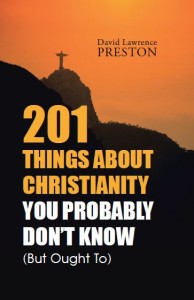Ann Widdecombe once presented a TV programme on the future of Christianity. Ms Widdecombe is a former government minister with a forthright manner somewhat reminiscent of Margaret Thatcher, her political hero. When the Church of England voted to allow women clergy, she promptly resigned her place on the ruling Synod and became a Roman Catholic, arguing that women are not equipped to become priests. Since leaving the House of Commons, she has lightened up somewhat, having written a novel, appeared on a TV reality show and occasionally contributed to discussion shows and debates. But behind the more relaxed image, the same redoubtable attitude remains.
During the programme, she debated with a Humanist. He argued that the whole basis of Christianity was flawed. There are no gods, no angels and no devil, he argued. ‘Miracles’ that break the physical laws of the universe simply do not happen; morality doesn’t depend on believing in these things and it is perfectly possible to live an ethical life without them.
‘Don’t you believe in love and peace, and being kind to each other?’ she countered. He said, of course he did, but that didn’t make him a Christian. All the great religions teach love, compassion, forgiveness and right living, as did Yeshua, the Nazarene. Humanism does too. They’re largely common sense and do not require Christian theology to support them. And he’s right, of course, BECAUSE ITS NOT THESE THINGS THAT DEFINE WHAT IT MEANS TO BE A CHRISTIAN!
Merely following the gospel teachings of Yeshua does not make you a Christian. It’s more important to believe certain things about him – especially who he was and why he came to Earth.
Christianity’s great apostle, Paul of Tarsus, made this very clear. Only by believing that the recently deceased Yeshua was the one and only son of God, sent to save us from our sins through his suffering, death and resurrection could we have a right relationship with our creator and be guaranteed our place in eternity. This, not the way one behaves, is what distinguishes a Christian from a non-Christian.
Ironically, even in the twenty-first century, you could live as Yeshua intended and still not be regarded as a good Christian by most churches if you do not attend church regularly, believe in the virgin birth and resurrection and observe all the sacraments.
So how should a person seeking spiritual knowledge relate to the traditional Christian teachings? Do we have to accept that we are in our very essence these terrible, sin-ridden beings? Are we obliged to believe in a virgin birth, a bodily resurrection from the dead and a man rising up to heaven on a cloud to realise our spirituality and be good people?
Interestingly, there is plenty of evidence that many clergy don’t believe these things even though they preach them from the pulpit every Sunday. In the early 1980s, the Anglican Bishop of Durham, Dr David Jenkins, caused a stir when he expressed his conviction that you don’t have to believe in the virgin birth or bodily resurrection to be a good Christian. Three days after his consecration as Bishop in York Minster the cathedral was set on fire by a bolt of lightning which zealous Christians interpreted as a sign of divine disapproval at his appointment.
But there was nothing new in what Dr Jenkins – an advanced theologian with a distinguished record in academia – was saying; it’s a fallacy to think people only started questioning the basis of Christianity in the twentieth century and in particular the 1960s. Throughout the last two thousand years many have expressed their doubts and have suffered persecution and death as a consequence. Even today it would take a brave priest to tell the Pope face to face that he doesn’t believe in the virgin birth or resurrection!
If – as Christianity teaches – you have to believe in fairy tales and reject science to realise your spirituality, then Christianity is a barrier separating people from their spiritual selves. That’s why it’s about time orthodox Christianity were consigned to history.
Copyright David Lawrence Preston, 22.3.2016
Follow me on Facebook and Twitter @David_L_Preston
Look out for my book (Hay House/Balboa Press):



